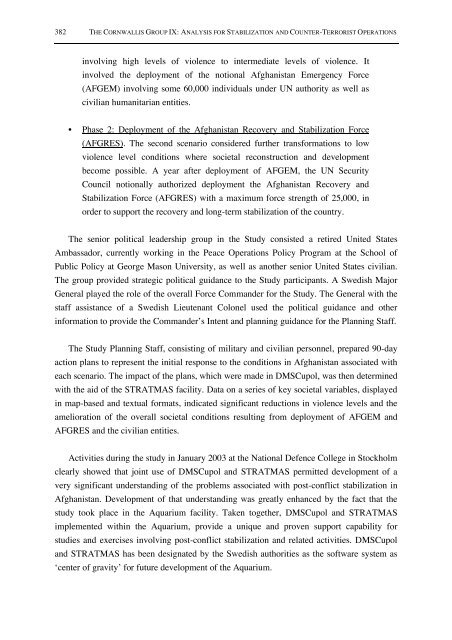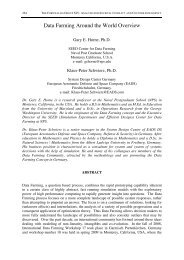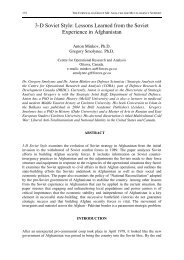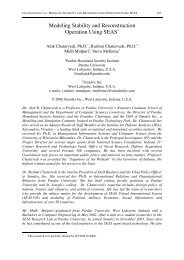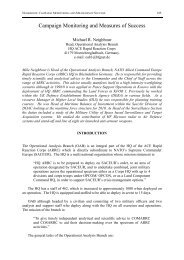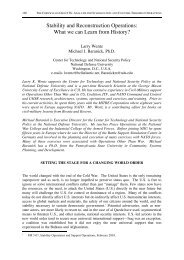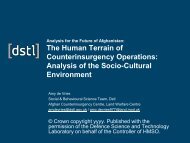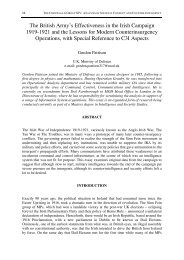Finding Robust Definitions for Feedback Stability ... - Cornwallis Group
Finding Robust Definitions for Feedback Stability ... - Cornwallis Group
Finding Robust Definitions for Feedback Stability ... - Cornwallis Group
You also want an ePaper? Increase the reach of your titles
YUMPU automatically turns print PDFs into web optimized ePapers that Google loves.
382 THE CORNWALLIS GROUP IX: ANALYSIS FOR STABILIZATION AND COUNTER-TERRORIST OPERATIONSinvolving high levels of violence to intermediate levels of violence. Itinvolved the deployment of the notional Afghanistan Emergency Force(AFGEM) involving some 60,000 individuals under UN authority as well ascivilian humanitarian entities.• Phase 2: Deployment of the Afghanistan Recovery and Stabilization Force(AFGRES). The second scenario considered further trans<strong>for</strong>mations to lowviolence level conditions where societal reconstruction and developmentbecome possible. A year after deployment of AFGEM, the UN SecurityCouncil notionally authorized deployment the Afghanistan Recovery andStabilization Force (AFGRES) with a maximum <strong>for</strong>ce strength of 25,000, inorder to support the recovery and long-term stabilization of the country.The senior political leadership group in the Study consisted a retired United StatesAmbassador, currently working in the Peace Operations Policy Program at the School ofPublic Policy at George Mason University, as well as another senior United States civilian.The group provided strategic political guidance to the Study participants. A Swedish MajorGeneral played the role of the overall Force Commander <strong>for</strong> the Study. The General with thestaff assistance of a Swedish Lieutenant Colonel used the political guidance and otherin<strong>for</strong>mation to provide the Commander’s Intent and planning guidance <strong>for</strong> the Planning Staff.The Study Planning Staff, consisting of military and civilian personnel, prepared 90-dayaction plans to represent the initial response to the conditions in Afghanistan associated witheach scenario. The impact of the plans, which were made in DMSCupol, was then determinedwith the aid of the STRATMAS facility. Data on a series of key societal variables, displayedin map-based and textual <strong>for</strong>mats, indicated significant reductions in violence levels and theamelioration of the overall societal conditions resulting from deployment of AFGEM andAFGRES and the civilian entities.Activities during the study in January 2003 at the National Defence College in Stockholmclearly showed that joint use of DMSCupol and STRATMAS permitted development of avery significant understanding of the problems associated with post-conflict stabilization inAfghanistan. Development of that understanding was greatly enhanced by the fact that thestudy took place in the Aquarium facility. Taken together, DMSCupol and STRATMASimplemented within the Aquarium, provide a unique and proven support capability <strong>for</strong>studies and exercises involving post-conflict stabilization and related activities. DMSCupoland STRATMAS has been designated by the Swedish authorities as the software system as‘center of gravity’ <strong>for</strong> future development of the Aquarium.


